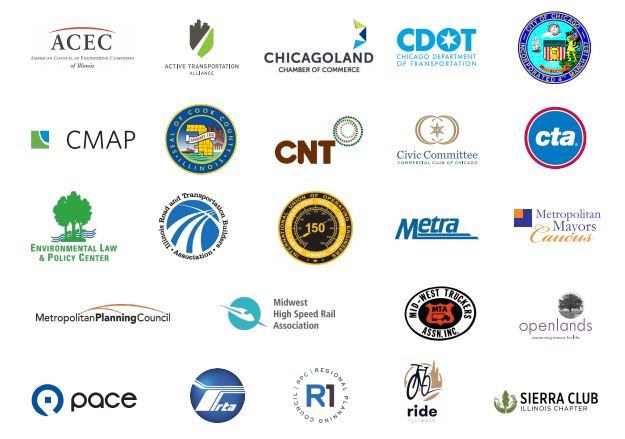Sustainable transportation funding for Illinois

The Metropolitan Planning Council is part of growing group of regional, statewide leaders calling on Illinois to reform its approach to investing in a safe, reliable transportation system
Illinois needs a new kind of capital bill that protects the public while meeting state’s transportation investment needs
CHICAGO, April 29, 2019 – The Metropolitan Planning Council is part of a growing group of regional and statewide leaders calling for reforms to achieve a new kind of capital bill that ensures state funding is spent wisely to protect the public while delivering a safe, reliable transportation system.
Members of the group include Active Transportation Alliance, American Council of Engineering Companies-Illinois, Center for Neighborhood Technology, Chicago Department of Transportation, Chicago Metropolitan Agency for Planning, Chicago Transit Authority, Chicagoland Chamber of Commerce, City of Chicago, Civic Committee of the Commercial Club of Chicago, Cook County, Environmental Law and Policy Center, Illinois Road and Transportation Builders Association, International Union of Operating Engineers Local 150, Metra, Metropolitan Mayors Caucus, Metropolitan Planning Council (MPC), Midwest High Speed Rail Association, Mid-west Truckers Association, Openlands, Pace, Regional Transportation Authority, Ride Illinois, Rockford Regional Planning Council, and Sierra Club-Illinois Chapter.
The regional and state network of roads, bridges, and transit is in such dire need of reinvestment that it’s putting residents and businesses at risk. New revenues are urgently needed – but Illinois cannot afford business as usual. NAME of ORG and members of the group agree that revenue sources must be sustainable, accountable, fair, equitable, and flexible.
Sustainable – A long-term solution that can adapt to changing circumstances
New transportation revenues must provide sufficient and sustainable funding to improve, enhance, and expand Illinois’ transportation systems. New funding, as well as existing fares and tolls, should grow sustainably—such as by indexing rates to inflation—to keep pace with the costs of operating and improving the system, which inevitably increase over time. A capital bill should emphasize a pay-as-you-go program, sized to the revenues available, with the appropriate mix of bonding. And local governments should be empowered to raise their own transportation funding to supplement state revenues.
Accountable – Choose the projects with the greatest impact
Past capital bills have funded many specific projects that were not carefully analyzed for their value or that did not address the most pressing needs. Taxpayers have to know their dollars are being directed to the projects that provide the greatest economic, environmental, safety, and equitable benefit. The legislation should require a transparent, data-driven process to choose projects.
Fair – User fees paid by those who gain the most benefit from the system
Costs should be paid primarily by those who use the transportation system the most or derive the most benefit. Any new state revenue from transportation sources must go only to transportation purposes, as the Illinois Constitution requires, with auditing to assure compliance.
Equitable – Giving a leg up where it is needed
Investing in transportation can provide significant and lasting benefits to people and communities that have historically been excluded from the economy. Transportation projects can both increase access to jobs, education, and other necessities and provide employment opportunities in transportation professions. Agencies should prioritize projects that enhance mobility for people who have the fewest options today, bridge racial and socioeconomic divides, and remove barriers to economic opportunity. Workforce diversity initiatives should be a major part of new transportation funding programs. Public investment may be necessary to ensure that new technologies are deployed equally across our communities. To promote equity, revenue enhancements should reduce the burden of increased costs on lower income individuals or offset such costs through other tax strategies.
Flexible – Fund all modes, especially addressing transit’s capital needs
Revenue must be allocated flexibly to improve not only the state’s road network but also transit, intercity rail, bicycle, trails, pedestrian, and safety infrastructure to meet the needs of all users and to increase access to low-pollution and low-cost modes of transportation. Establishing a dedicated state revenue source for transit and increasing overall funding for transit is a particularly high priority. All users should contribute to maintaining the system, and be encouraged to use using low-impact modes of transportation.
Read or link to these principles online here.